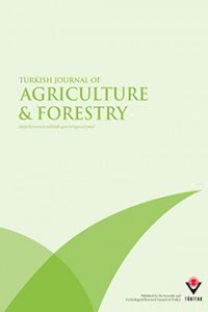Biological Control of Bacterial Spot Disease of Pepper with Bacillus Strains
Bacterial spot disease caused by Xanthomonas axonopodis pv. vesicatoria (X. axonopodis pv. vesicatoria) is a devastating pepper (Capsicum annuum) disease in Turkey. Biological control of Xanthomonas axanopodis pv. vesicatoria is of great interest, in terms of environmental safety and economic return. In this study, 3 Bacillus strains isolated from soil samples of the rhizospheres of peppers grown in greenhouses and fields were used to suppress the size of the population of X. axonopodis pv. vesicatoria. Results indicated that disease development decreased by 11%-62% and 38%-67% in pepper plants inoculated with the 3 Bacillus strains alone and in combination, respectively, in greenhouse and field experiments. In addition, stem diameter, root elongation, root dry weight, shoot dry weight, and yield increased in response to the treatments in the field experiment by 7.0%-20.5%, 7.0%-17.0%, 4.5%-23.5%, 16.5%-38.5%, and by 11.0%-33.0%, respectively. This is the first study to report the successful biological control of bacterial spot disease caused by X. axonopodis pv. vesicatoria using Bacillus species in Turkey.
Biological Control of Bacterial Spot Disease of Pepper with Bacillus Strains
Bacterial spot disease caused by Xanthomonas axonopodis pv. vesicatoria (X. axonopodis pv. vesicatoria) is a devastating pepper (Capsicum annuum) disease in Turkey. Biological control of Xanthomonas axanopodis pv. vesicatoria is of great interest, in terms of environmental safety and economic return. In this study, 3 Bacillus strains isolated from soil samples of the rhizospheres of peppers grown in greenhouses and fields were used to suppress the size of the population of X. axonopodis pv. vesicatoria. Results indicated that disease development decreased by 11%-62% and 38%-67% in pepper plants inoculated with the 3 Bacillus strains alone and in combination, respectively, in greenhouse and field experiments. In addition, stem diameter, root elongation, root dry weight, shoot dry weight, and yield increased in response to the treatments in the field experiment by 7.0%-20.5%, 7.0%-17.0%, 4.5%-23.5%, 16.5%-38.5%, and by 11.0%-33.0%, respectively. This is the first study to report the successful biological control of bacterial spot disease caused by X. axonopodis pv. vesicatoria using Bacillus species in Turkey.
